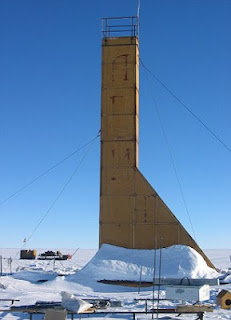
- Drilling successful as scientists break through into lake buried miles under Antarctic ice
- Scientists confirm breakthrough into buried lake
- Have raised sample of 40 litres of water
- Frozen sample will be removed in December in next Antarctic summer
- 'Like exploring another planet except this one is ours', scientist
- Lake has had no contact with man-made pollutants or Earthly life forms for millions of years
By Rob Cooper and Thomas Durante
After more than two decades of drilling in Antarctica, Russian scientists have confirmed that they reached the surface of a gigantic freshwater lake hidden under miles of ice for some 20 million years.
The scientists returned 40 litres of water to the surface - water isolated from earthly life forms since before Man existed.
The scientists will later remove the frozen sample for analysis in December when the next Antarctic summer comes. They have now left the site.
The scientists rebuffed claims that their drilling could have contaminated the lake, a body of water which has been in isolation for 20 million years.
The Russian researchers have insisted the bore would only slightly touch the lake's surface and that a surge in pressure will send the water rushing up the shaft where it will freeze, immediately sealing out the toxic chemicals.
Lukin said about 50 cubic feet of kerosene and freon poured up to the surface from the boreshaft, proof that the lake water streamed up from beneath, froze, and blocked the hole.
'It's like exploring another planet, except this one is ours,' said Columbia University glaciologist Robin Bell
Valery Lukin, the head of Russia's Arctic and Antarctic Research Institute (AARI), which is in charge of the mission, said in Wednesday's statement that his team reached the lake's surface on Sunday.
Lukin has previously compared the Lake Vostok effort to the moon race that the Soviet Union lost to the United States, telling the Russian media he was proud that Russia will be the first this time. Although far from being the world's deepest lake, the severe weather of Antarctica and the location's remoteness made the project challenging.
'There is no other place on Earth that has been in isolation for more than 20 million years,' said Lev Savatyugin, a researcher with the AARI. 'It's a meeting with the unknown.'
After more than two decades of drilling in Antarctica, Russian scientists have confirmed that they reached the surface of a gigantic freshwater lake hidden under miles of ice for some 20 million years.
The scientists returned 40 litres of water to the surface - water isolated from earthly life forms since before Man existed.
The scientists will later remove the frozen sample for analysis in December when the next Antarctic summer comes. They have now left the site.
The scientists rebuffed claims that their drilling could have contaminated the lake, a body of water which has been in isolation for 20 million years.
The Russian researchers have insisted the bore would only slightly touch the lake's surface and that a surge in pressure will send the water rushing up the shaft where it will freeze, immediately sealing out the toxic chemicals.
Lukin said about 50 cubic feet of kerosene and freon poured up to the surface from the boreshaft, proof that the lake water streamed up from beneath, froze, and blocked the hole.
'It's like exploring another planet, except this one is ours,' said Columbia University glaciologist Robin Bell
Valery Lukin, the head of Russia's Arctic and Antarctic Research Institute (AARI), which is in charge of the mission, said in Wednesday's statement that his team reached the lake's surface on Sunday.
Lukin has previously compared the Lake Vostok effort to the moon race that the Soviet Union lost to the United States, telling the Russian media he was proud that Russia will be the first this time. Although far from being the world's deepest lake, the severe weather of Antarctica and the location's remoteness made the project challenging.
'There is no other place on Earth that has been in isolation for more than 20 million years,' said Lev Savatyugin, a researcher with the AARI. 'It's a meeting with the unknown.'
Savatyugin said scientists hope to find primeval bacteria that could expand the human knowledge of the origins of life.
'We need to see what we have here before we send missions to ice-crusted moons, like Jupiter's moon Europa,' he said.
Lake Vostok is 160 miles long and 30 miles across at its widest point, similar in area to Lake Ontario. It lies about 2.4 miles beneath the surface and is the largest in a web of nearly 400 known subglacial lakes in Antarctica. The lake is warmed underneath by geothermal energy.
http://www.dailymail.co.uk/sciencetech/article-2095193/Lake-Vostok-Russian-scientists-confirm-triumph-drilling-successful-Antarctica.html#ixzz1lqVDcWXC


No comments:
Post a Comment